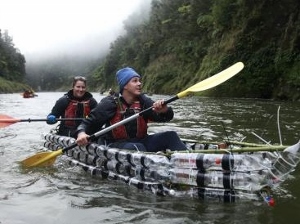
The plastic bottle kayaks will be put to the test with thousands of children eagerly following their journey. The world’s first message in a bottle kayaks, each bottle contains artwork and words of support from school children. The messages have been just one component of a wider education programme currently being implemented alongside the curriculum in 33 schools.
Preparing for a ‘waste positive’ adventure means rethinking the choices made at the checkout when shopping for supplies. Snack foods like chips and pre-packaged muesli bars are out, replaced by home baking and bulk bin – and bring your own bag – treats. For the Plastic Bottle Kayak team, becoming a conscious consumer is being part of the solution.
Team co-leader Florence Reynolds says it is our ‘business-as-usual’ approach that is destroying our future.
“If a group of youth can run an adventure that seems impossible and uses waste without generating any, then we are surely able to make easy changes in our personal lives, communities, and political arenas to make sure we have a liveable world for our generation and the next,” she says.
Mr McDell says he is “really excited to be involved in this amazing project”.
“I’m always striving to find ways to educate our younger generation on conservation and The Plastic Bottle Kayak is the perfect way to introduce people into sustainable practices and make it fun and interesting.”
Those interested in following the epic journey can connect with the team on Twitter @bottlekayaknz and find out more using the hashtag #PBKQnA
The much-delayed English draft curriculum is now out for consultation, generating discussion from teachers.
Research from AUT demonstrates arts, culture and recreation have positive impacts on all aspects of…
How effective has the school phone ban been in achieving its aims? Researchers from the…
School camps and excursions deliver hands on learning experiences, helping to consolidate classroom learning.
Innovations in AV technologies present new opportunities to engage with students. We look at how…
A new report from the University of Auckland’s Our Voices Project asks young people what…
This website uses cookies.